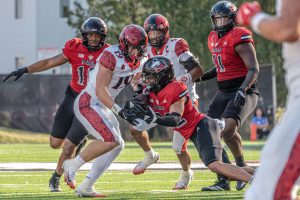Prof. advocates change in laws
March 22, 2004
The debate about same-sex marriages should be called “Queer Law for the Straight Guy,” said Mark Wojcik, professor at the John Marshall Law School, during his lecture Friday afternoon at NIU’s law school.
Sponsored by the Law Review and Amnesty International, Wojcik’s lecture focused on the history of gay marriages and reasons why they should be legalized.
About 38 states already have passed laws banning same-sex marriages and define marriage as “a union between a man and a woman.”
Religion, tradition and family are the three main reasons why marriage is limited to a man and a woman, as defined by the Hawaii Supreme Court in the early 1990s, Wojcik said.
“Opponents claim that marriage has always been a man and a woman,” he said. “If this was true, women would not have the right to vote, there would be no interfaith marriages and we’d still have slavery. Laws change; societies change.”
Opponents also argue that civil unions will provide the same benefits of marriage. However, Wojcik said it isn’t enough because such unions won’t be recognized when a gay couple leaves the state.
Wojcik said there’s a slim chance for civil unions in Illinois.
“I don’t see it happening,” he said. “We can’t even get the non-discrimination bill. In most parts of Illinois, it is still legal to fire someone if they are gay except if they have a local ordinance.”
Wojcik also said there was an amendment in the Illinois Senate to amend the constitution to prohibit same-sex marriage, civil unions and all other forms of same-sex relationships.
Gabriela Tejeda, a second-year law student, said she attended the lecture because she supports same-sex marriages.
“I’m interested in what’s been happening with same-sex couples, especially in Chicago,” Tejeda said. “President Bush amending the Constitution is a hot topic.”
In November, the Massachusetts Supreme Judicial Court ruled that same-sex marriages will become legal on May 17.
“It’s a matter of being able to put order into your life,” Wojcik said. “It’s about official recognitions and about the practical realities of day-to-day lives that most people take for granted.”






